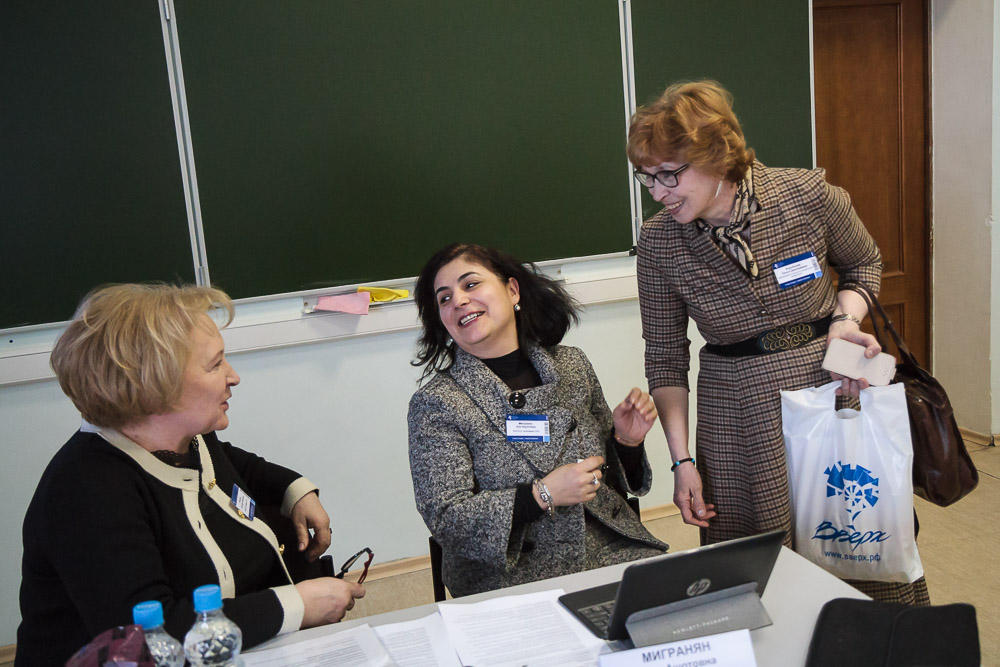
Published: March 30th, 2017
On March 30, within the framework of the Moscow Economic Forum, a round table entitled "Practices of post socialism: lessons for Russia" was held. The conference aims at analyzing and assessing the results of the transformation of the economic systems of the states of Central and Eastern Europe, the post-Soviet space and a number of Asian countries through the prism of Russia's challenges of modernization and development in the face of global challenges and growing uncertainty.
The moderator of the discussion was the head of the scientific direction "International Economic and Political Studies" of the Institute of Economics of the Russian Academy of Sciences, Doctor of Economics, Professor Glinkina Svetlana Pavlovna and Leading Researcher of the Center for Post-Soviet Studies at the Institute of Economics of the Russian Academy of Sciences, Doctor of Economics, Professor Migranyan Aza Ashotovna.
Pylin Artem Gennadievich, Head of the Sector for Bilateral Relations between Russia and the Neighboring Countries of the Institute of Economics, described the economic modernization of the post-Soviet countries in the context of Eurasian integration. According to the expert, Georgia and Azerbaijan deserve special attention, these countries can be called leaders in terms of the pace of modernization in the region. The modernization of the CIS countries is based on technologies borrowed from abroad. However, the weakness of the national, innovative sphere does not yet allow us to achieve a high degree of industrial and technological coherence of economies. One of the main risks the expert makes is the retention of sanctions. According to Pylin, it is necessary to move to sectoral cooperation, and also to cooperate with third countries within the framework of the EEC.
"The economy should be complemented by the search for new drivers of cohesion, social, innovative, infrastructure and security issues, which is the most relevant recently," the expert concluded.
With the report "Efficiency of the state management of the CIS countries: tendencies, models, strategies of economic development" Aza Ashotovna Migranyan spoke. In the course of her research, Aza Ashotovna Migranyan came to the conclusion that of all post-Soviet countries, Armenia is the only country with advanced development. The expert also refers to successful regions Azerbaijan, Turkmenistan, Kazakhstan, Tajikistan, while Kyrgyzstan, Moldova and Ukraine remain problematic. Having considered the development strategies of different countries, the expert came to the conclusion that the most profitable models for Russia could be Uzbekistan and Kazakhstan.
Mezhevich Nikolay Maratovich, Professor of the Department of European Studies at the Faculty of International Relations of the St. Petersburg State University, presented a report on the experience of the Baltic region. The speaker stressed that the Baltic states began to develop on their own model as part of the Soviet Union, and at the moment has its own unique system of economic development. In the Baltic model, the expert singled out such positive aspects as the concept of e-state and e-government, the openness of statistical data, the possibility of e-voting, housing reform, and the tax system. To negative lessons, the speaker referred to politicization and banking policy. Thus, Mezhevich concludes, the Baltic States could become an important, illustrative example for Russia.
Kulikova Natalia Vladimirovna, head of the Center for Eastern European Studies at the Institute of Economics of the Russian Academy of Sciences, spoke about the experience of Eastern and Central Europe and stressed that in Russia this model can not be realized. The expert states that the same model can produce results under certain conditions, but in others it does not. Thus, the CEE countries have the following advantages from joining the EU: adoption of better institutions that operate in the EU, financial assistance from EU funds and economic integration. However, during the global crisis, the Polish economy, the least integrated into the EU market, demonstrated its greatest resilience in all these difficult conditions.
"From what has been said, it follows that one should not believe the myth of successful reforms and successful development in the CEE countries. However, this does not mean that they can not at all find a positive experience, the use of which could be useful in developing a strategy for the development of Russia, "Kulikova came to such a conclusion.
A similar point of view on the development of the CEE and Baltic countries was voiced by Andrzej Gubart, co-author of his research is Vladislav Vorotnikov. Speaker talked about the trap of average income, when a single economy after a period of rapid economic growth slows down the pace of its economic development or enters a period of prolonged recession. According to the expert, we should not exclude the possibility of a drop in the rates of economic growth in the region in the coming years.
The results of the research of the Institute of Economics on the "Chinese factor in the development of the post-socialist world: expectations, realities and forecasts" were presented by Madina Oktamovna Turaeva. "China is increasing its power, expanding its delivery infrastructure, exporting both technologies and specialists," the expert said. According to the author's team, presented by the speaker, in the conditions of active Sinology of the post-Soviet space, it is necessary to involve China in all formats of multilateral cooperation, so that at least somehow formal agreements, frameworks, limit expansion in the region.
During the discussion, the participants also discussed such issues as sources of economic growth, capitalism in the post-socialist space, economic nationalism and economic liberalism, problems and mechanisms of interaction between government and society, the mechanisms of a socially oriented model of the economy.Latest news
07.05.2018 MEF-2018: debate "Cultural policy: between individual freedom and the interests of society?"
07.05.2018 MEF-2018: Conference No. 8
07.05.2018 MEF-2018: Conference No. 4
07.05.2018 MEF-2018: Conference No.3
07.05.2018 MEF-2018: Conference No. 2
07.05.2018 MEF-2018: Conference No.1
26.04.2018 McConnell Discusses Information Warfare
20.04.2018 MEF-2018: closing plenary session
17.04.2018 Mr. Freysinger: «Skripal’s case» for relationship between Russia und European Union?
